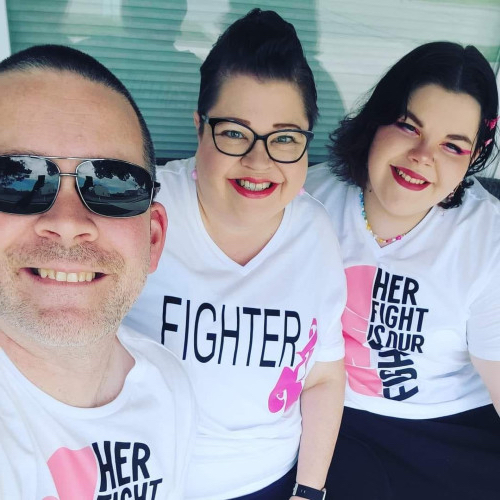Jaimie Hutchison is the director of the Michigan State University WorkLife Office and a current breast cancer patient. She has spent the last six months receiving chemotherapy infusions and will soon undergo surgery, targeted infusions and radiation.
I was diagnosed with HER2+ breast cancer in May. Like many people, I did not get my annual mammograms during the height of the COVID-19 pandemic. With no family history of cancer, I was very surprised to hear I had breast cancer. Later, I learned that 80% of breast cancer cases are not genetic, but random.

These months have been among the hardest for me and my family and have created the most demanding work-life conflict we’ve ever navigated.
For the last 4 ½ years at the WorkLife Office, I’ve worked to help people advocate for themselves, utilize supportive resources and strive to find work-life fit through their many identities and life demands. I have assisted folks in navigating conversations with their bosses and teams about their health needs and their caregiving needs.
Now, it is my turn to put my knowledge and advice into action. Like many, my spouse and I have experience caregiving to a child and aging parents. Through this, I have learned just how little most of us know about being a caregiver to someone with a severe health issue. Breast cancer, like many other health conditions, can be a silent, lonely struggle.
During chemotherapy my energy was low. I was not able to drive and often felt physically and emotionally drained. My spouse became the primary caregiver for me and our teenager while continuing to work a full-time job at MSU.
Caregiving for us includes:
-
Handling nearly all the in- and out-of-home chores like cooking, getting groceries, picking up prescriptions, handling returns, etc.
-
Assisting in filling out reams of paperwork. It is like an extra part-time job staying on top of all the paperwork for doctors, specialists, therapists, etc.
-
Driving to all the appointments and taking copious notes, as well as being symptom logger and medication verifier.
-
Being our primary support person through our emotional ups and downs caused by medication, stressors, hormone swings and the fact that I was fighting for my life.
Of course, life does not stop. Our dryer broke, our washer broke, our basement flooded, our AC stopped working and so much more.
There have been many things that have helped me to navigate these very uncertain times. We are fortunate to have support from our extended caregivers, including family and friends. At MSU, that includes my supportive leadership, my phenomenal team and my fabulous colleagues. When I first disclosed my breast cancer diagnosis, I received over 150 messages of support, encouragement and sisterhood from Spartans. I have heard from other survivors and from those who have been a caretaker to someone with cancer. There are a lot of us out here.
People often ask me what they can do to help. The number one hope that I have is that you are all taking care of yourselves. Please remember to schedule your routine medical appointments.
If you are a supervisor or coworker of someone navigating severe health concerns, listen with an open mind, problem-solve together and offer the most flexibility you can for that person. If you are a supervisor or a colleague of a caregiver, please show them grace, empathy and support. They are trying to be the best version of themselves as they care for their loved ones and continue their everyday life.
Caregivers are often invisible. They are navigating things we just don’t talk about at work. Kind words and supportive statements can fuel patients and caregivers to keep going. It is not lost on me how fortunate my family is to have two stable incomes, supportive leaders, a community that has rallied around us and each other. Not everyone has this. We can all be the support that our colleagues need at work. Thank you for doing your part to support your fellow Spartans.